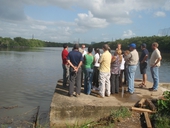Highlight
IGERT Fellow to establish NSF funded Urban Long Term Research Area (ULTRA) in San Juan Puerto Rico
Achievement/Results
ASU’s IGERT Fellow Tischa Muñoz-Erickson worked with natural and social scientists from the Luquillo LTER, various universities in San Juan, and the US Forest Service International Institute for Tropical Forestry (IITF) to establish a network of researchers and practitioners to develop an NSF funded Urban Long Term Research Area (ULTRA) in the city of San Juan. A collaborative proposal was developed that addresses concerns over the effects of extensive urban development on the environmental health and quality of life of urban residents, especially the impact that these activities pose to already vulnerable communities to hazards such as floods, hurricanes, etc. The proposal, titled “ULTRA-Ex: Social-Ecological Systems Change, Vulnerability, and the Future of a Tropical City”, was funded by the NSF (2009) and is now underway in San Juan. The San Juan ULTRA-Ex team now includes 20 natural and social scientists seeking to meet these objectives: 1) understand the linkages between ecological and social systems of San Juan and its surroundings; 2) develop and provide useful and relevant knowledge for management and decision-making; and 3) integrate scientific and local knowledge; 4) develop a reflexive and learning approach that collaborates with communities, decision-makers, managers, and other interest groups in the production of knowledge, synthesis of information, project implementation and education. The research will have significant implications for urban sustainability theory in general and urban social-ecological systems theory and methodology specifically. In addition to the synthesis and modeling of cities’ long-term sustainability, the project enhances interdisciplinary methods through transformative collaboration between social and biophysical scientists, and development of a vocabulary among the disciplines to achieve an effective synthesis. The overall questions being addressed are 1) How do biophysical, socio-economic, and institutional factors influence the vulnerability of natural and human dominated ecosystems within the Rio Piedras River Watershed socio-ecological system, and how have they changed spatially and temporally over the past 70 years? 2) To what degree have these vulnerability factors influenced the city’s potential for sustainability? 3) What are the alternative scenarios and indicators for the future development of the RPRW? 4) What organizational networks and policies support them, and to what extent are these influencing vulnerabilities and adaptive capacities for urban sustainability?
Address Goals
This activity addresses the primary goal of discovery through its significant implications for developing urban sustainability theory in general and urban social-ecological systems theory and methodology specifically. To develop the NSF proposal for San Juan ULTRA Tischa engaged natural and social scientists, and key stakeholders through various activities, including a needs assessment survey, a field trip, and interdisciplinary workshops. In addition to the synthesis and modeling of cities’ long-term sustainability, the project enhances interdisciplinary methods through transformative collaboration between social and biophysical scientists, and development of a vocabulary among the disciplines to achieve an effective synthesis. A broadly inclusive workforce (second goal) is being accomplished by the recent stakeholder needs assessment survey with participation of 64 organizations from San Juan. Results from this survey are being analyzed and are helping inform ULTRA’s research agenda and collaborative methods. Tischa has also developed an organizational structure for the research program, including committees for each of the research questions being addressed. Each group is in the process of developing work plans to carrying out research and meeting program objectives. These work plans were presented during an All Scientists Meeting held on March 30th in San Juan, Puerto Rico. Major outcomes of this meeting include integration of work plans, the development of a socio-ecological network of sampling sites (developed together by natural and social scientists), and the cross-coordination of protocols for three social surveys and the student work force that will be implementing them. Tischa is now leading the process of coordinating each investigator’s tasks to ensure collaboration and integration in the implementation of the research.






